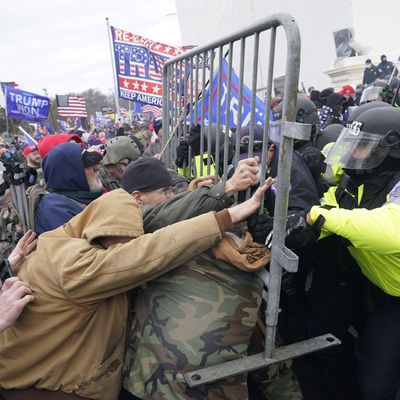
In the aftermath of the January 6 insurrection, when both parties agreed on the need for an investigation into the attack, the shorthand that entered the lexicon was 9/11-style commission. When, on January 12, Illinois Republican Rodney Davis introduced a bill to create a commission, he noted that “the commission’s structure is in line with the 9/11 Commission.” “Momentum is growing on Capitol Hill for an independent 9/11-style commission,” reported The Hill later that month.
But when media accounts these days describe the political wrangling over the investigation, the once-ubiquitous term now rarely appears. The reason for this is that the entire political context for the investigation has changed. The insurrection was briefly considered an event akin to 9/11: an outside attack, which in its horror would unite the parties.
Now Republicans see the insurrection as an action by their political allies. Some of them are embarrassed by the insurrection and wish to avoid discussing it, while others see its members as noble martyrs. But almost none of them actually have the stomach to denounce the rioters any more.
That broader context has been obscured by a series of maneuvers over the investigating committee — first by Republicans’ appointing Jims Banks and Jordan, two ardent Trumpists, followed by Democrats rejecting the Republicans’ appointments, followed by Republicans’ boycotting the committee and calling for their own. Two months ago, House Minority Leader Kevin McCarthy opposed a bipartisan commission as “duplicative,” and now he has proposed to counter the committee by creating a literal duplicate.
Politico reporter Rachel Bade suggests the squabbles over the commission’s members comes down to “whether silencing GOP voices is the right way to go in convincing GOP voters.” But at this point, this is not convincing. The Republican strategy was set long ago: It is to discredit the investigation and deflect attention onto Nancy Pelosi’s alleged failure to prepare, or Antifa violence, or anything they can throw at the wall other than the effort by a pro-Trump mob to forcibly cancel the election.
In the weeks since Washington briefly came together in shared outrage, Republicans have considered, and then rejected, impeaching Donald Trump over the attempted coup, then voted down a bipartisan commission in the Senate.
Trump, for his part, has energetically written the history of the episode.He has described the mob as a “a loving crowd” desiring only a fair outcome who were “ushered in by the police” only to be savagely attacked and murdered.
Not all, or even most, Republicans have gone so far as to affirmatively endorse this delusional revisionist narrative. But they have no desire either to revive their short-lived attempt to write the rioters out of the Republican party or to refute Trump’s campaign of lies about it.
Banks has dismissed the investigation as an effort to “malign conservatives.” He is not wrong, though there is a circularity to his reasoning. In the immediate aftermath of the insurrection, conservatives attacked it forcefully. Had they maintained that position, the investigation would not have threatened them. But since they have decided instead to defend it, anything that casts the riot in a bad light will necessarily besmirch the party that defends the rioters. That is a political choice, not an impersonal law of political physics.
The scrambling and confusion is the result of the fact that the January 6 commission was conceived in a political context that no longer exists. Congress never would have had a “9/11-style commission” if the hijackers had been supporters of, and had received support from, one of the political parties.






























